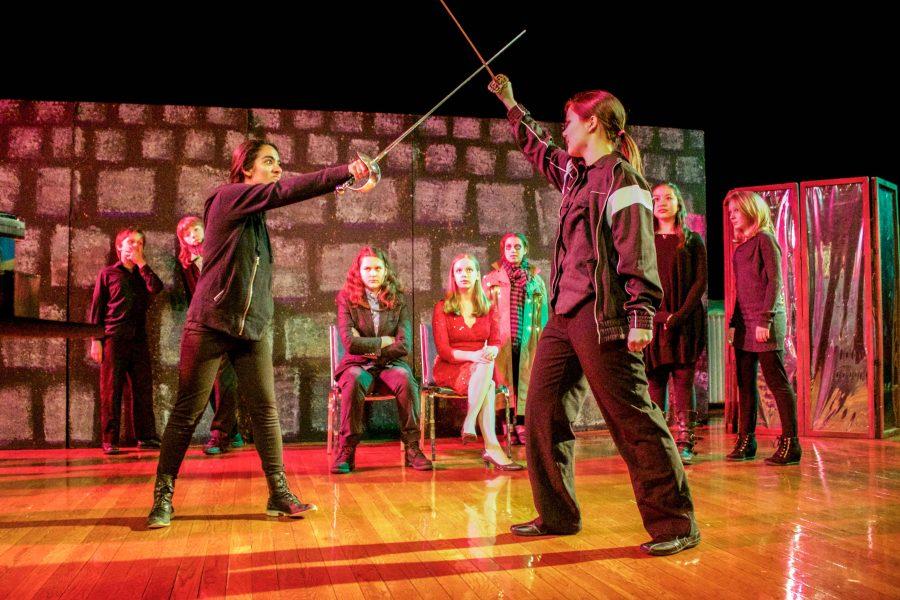Children’s Shakespeare Project Brings ‘Hamlet’ to Wilder Main
Photo Courtesy of Naomi Langer
Daria Martz, 13, and Alison Chan, 14, duel as part of Oberlin Children’s Shakespeare Project. The group will perform Hamlet on Friday and Saturday at 7 p.m. in Wilder Main.
May 6, 2016
This year may mark the 400th anniversary of William Shakespeare’s death, but the Oberlin Children’s Shakespeare Project has set out to make his plays young again. On Friday and Saturday at 7 p.m. in Wilder Main, the OCSP’s cast of elementary and middle school students will be performing Hamlet, directed by Annie Rasiel, OC ’15, who founded the project during her senior year at Oberlin.
“I did children’s theater growing up,” Rasiel said. “I was a weird kid and theater was my refuge. I specifically did Shakespeare growing up. I know how powerful it can feel to perform something when you’re very young that’s considered to be super weighty, and the power of realizing that it’s silly and fun and not necessarily as serious or as difficult as people say it is. Through demystifying Shakespeare, I feel like it opens a lot of doors to questioning elitism in general.”
13-year-old Daria Martz said that playing Hamlet allowed her to understand that the character’s erratic behavior is a result of the situation he’s put in. “All people make mistakes, and they have stuff to deal with,” Martz said. “The way that I play Hamlet, I believe that [he] is perfectly normal, but under the circumstances that he’s put under, he’s portrayed or seen to the audience as crazy or going insane, when he’s really just a normal person.”
Ryley Steggall, a 12-year-old who plays Rosencrantz, said that as he got to know the characters better when preparing for the performance and imagined parts of their stories that extended beyond the play’s plot.
“I wish that everybody knew how unique all the characters are,” she said. “Some of them have secrets you can only assume, and [the play] doesn’t exactly answer all of them. It always keeps your mind going, with all the secret plots and all the things you can infer about these characters. It’s fun to think about the stuff that could have happened, but didn’t. It’s like a giant jigsaw puzzle.”
Rasiel said the array of characters in Hamlet worked well for the young cast.
“Hamlet has a lot of really vivid characters and a lot of young characters,” Rasiel said. “Really watching kids get into the character work, writing diary entries from their characters, writing letters to other characters, knowing, as soon as I ask them what their character’s favorite color would be or what they were like when they were little — watching them inhabit their characters … is really exciting.”
Beyond building the characters, Rasiel emphasizes that the actors interact with the text on a deeper level than just memorization and recitation.
“The kids understand every word they’re saying,” Rasiel said. “We probably spend as much time analyzing the script as we do any kind of acting work, and they really know what it all means — every word, every metaphor.”
Steggall talked about how this priority has translated to her acting.
“There’s a lot of things in this play that you really have to pay attention to,” Steggall said. “There’s a lot of details that at first I didn’t pick out. Annie had to talk about them so we could figure it out. Sometimes they’re major, and sometimes they’re not so major, and as you get more in-depth into a play, you realize how complicated it is.”
All of the actors agreed that the atmosphere created by the program and their fellow cast members has helped make Shakespeare a positive experience.
“I’ve had days when I’m feeling sad, and I’ll come in here, and I’ll just leave the place laughing,” said 14-year-old Nicholas Bertoni, who plays Polonius. “There’s a really great energy.”
11-year-old Victoria Adair, who plays Guildenstern, also said her fellow cast members have influenced her experience with the play.
“It’s a really fun play to put on, even though it’s pretty depressing,” Adair said. “With this group of people doing it and … our surroundings, it’s just really fun to do. The most fun things have been the costumes and just hanging out with people.”
Bertoni said that acting in the play changed his perspective on it and has made him appreciate all the work actors put in to each small move.
“One of the things that I know about this play that I would never have guessed before is that Hamlet is not just a serious and intellectual play — it is that, it can be that — but it can be a really funny play as well,” he said. “And one of the things that you don’t get when … you haven’t been in a play is that you see 10-second glimpses of cool things that the actors do, but that joke or special effect or moment took an hour of work just for that one thing. It’s insane the amount of work that you have to put into it, but it’s great when you do it right.”
One of Rasiel’s goals for this production and for the Oberlin Children’s Shakespeare Project as a whole is that the actors take their experiences with them off the stage.
“I hope the kids take a confidence in their academic abilities, a confidence in the way they take up space, speaking loudly and clearly — a comfort in just standing still is something we work on a lot,” Rasiel said. “[We are] just breaking down any kind of reverence for canonical texts. They’re too young to know what the literary canon means, but they’re not too young to feel it. We’re breaking any kind of distance or elitism — [I want them to know] that they can read whatever they want, do whatever they want.”
























